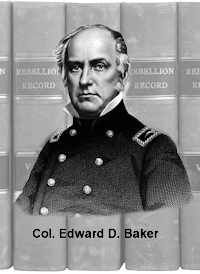March 21.—Yesterday an expedition was sent out to the vicinity of Indian Creek, west of Keitsville, Mo. Capt Stevens, with fifty-two men, and one of his mountain howitzers, were accompanied by thirteen home-guards. On the route, he was informed that a rebel force was to rendezvous at the house of one Boone the next night Capt Stevens approached the house early in the morning, and captured nine rebels who were in the house. Eight more, who arrived soon after, were also taken in. The prisoners thus taken, seventeen in number, who were all carried into the Union camp, include three rebel captains, to wit: James W. Bullard, George R. McMinn, and Jasper Moore. The men were all armed, and the arms fell into the hands of the Nationals. About one thousand pounds of bacon, which had been collected at the house for the use of the rebel army, was also taken possession of by the Union troops. —St. Louis Republican.
—Commodore Dc Pont, having received from the Mayor and inhabitants of St Augustine, Fla., an invitation to take possession of that place, several gunboats, with the battalion of marines, proceeded down and came to off the harbor, where they found that Com. Rodgers, of the Wabash, had taken quiet possession of the place, with his marines and some volunteer soldiers, under Gen. Sherman. The volunteers had possession of the fort, and the marine-guard were quartered in the towa—(Doc. 101.)
—Two new military departments were constituted by the President; the first, called the Department of the Gulf, which comprises all the coast of the Gulf of Mexico, west of Pensacola harbor, and so much of the Gulf States as might be occupied by the forces under Major-Gen. B. F. Butler, United States Volunteers; the headquarters to be wherever the General commanding was. The other was denominated the Department of the South, comprising the States of South-Carolina, Georgia and Florida, with the expedition and forces under Brig.-General T. W. Sherman, to be under the command of Gen. David Hunter.
—Secretary Welles, of the United States Navy Department, made the following acknowledgment of services rendered by Lieut. George U. Morris, and the men of the Cumberland:
“Sir: In the calamitous assault of the armed steamer Merrimac upon the sloop Cumberland, and frigate Congress, on the ninth inst, which were comparatively helpless, the Department has had occasion to admire the courage and determination of yourself, and the officers and men associated with you, who, under the most disastrous and appalling circumstances, boldly fought your formidable assailant, exposed, as you were, to an opponent secure in his armor, while attacking the Cumberland. To your honor, and that of those associated with you, the guns were coolly manned, loaded and discharged, while the vessel was in a sinking condition, and your good ship went down with the flag at the gaff, and its brave defenders proved themselves worthy of the renown which has immortalized the American navy. The gallant service of yourself and the brave men of the Cumberland, on the occasion, is justly appreciated by a grateful country, and the Department, in behalf of the Government, desires to thank you and them for the heroism displayed, and the fidelity with which the flag was defended.”
—At a meeting of the cashiers of the Associated Banks of Baltimore, to-day, all the Banks being represented, the following resolution was unanimously adopted, namely:
“Resolved, That United States Demand Treasury Notes shall be received by the Associated Banks of Baltimore, on and after Saturday, the twenty-second inst, without limit, on deposit.
—This day a boat-fight took place at Mosquito Inlet, Florida, in which Lieut. Commanding T, A. Budd, and Acting Master Mather, together with three sailors of the United States Navy, were killed.— (Doc. 102.)
—The Norfolk Day-Book of this day complains that drunkenness is frightfully on the increase in Virginia. It firmly denounces the officers and soldiers, but censures the civilians less harshly. Here is a portion of its remarks:
“Whisky—Whisky—Whisky. — In the cars, at the shanties, at the groceries, in village taverns and city hotels—whisky. Officers with gold lace wound in astonishing involutions upon their arms, private soldiers in simple homespun, and civilians in broadcloth, all seem to drink whisky with persistent energy and perseverance. They drink it too, in quantities which would astonish the nerves of a cast-iron lamp-post, and of a quantity which would destroy the digestive organs of the ostrich. Truth is often unpleasant to tell, but the public safety demands that the vice in question should be rebuked and reformed; for it is a fact which the press should neither palliate nor conceal, that whisky which is no more akin to rye than rye is to coffee—whisky which is of the unadulterated tangle—first chain-lightning distillation is guzzled down in a manner alike revolting to public decency and the general good.”
—Washington, N. C, was occupied by the National forces under Gen. Burnside. The Unionists landed from their gunboats, and, headed by a band of music, marched through the town, playing Hail Columbia, and waving the Stars and Stripes at a lively rate. The few people who had remained in the place since the fall of Newbern, received them with marked coolness. Their music and their banners wholly failed to arouse any of that Union feeling which Marble Nash Taylor collected several thousand dollars in New-York to set free, so they left without disturbing cither persons or property.—Petersburg (Va.) Express, March 27.



